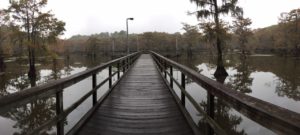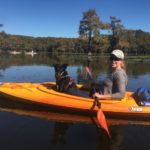On the Ballot November 5: Proposition 5 for Texas State Park Funding
By Michaela McCown

Several times a year, but especially in October, my husband and I make an effort to get out of Waco for a weekend and enjoy the scenery at one of our local state parks. We hike, kayak, watch birds and wildlife, camp, stargaze, and use the time out in nature to decompress from the busyness of our jobs and reconnect with the environment around us. This time is particularly essential for my sanity, and I appreciate having such beautiful public parks around Texas to go visit!
Studies have shown the benefits of spending time outdoors – nature experiences may reduce stress, anxiety, depression, and attention deficits (Kellert, 2005; Louv, 2005, Buzzell & Chalquist, 2009). With over 80% of North Americans living in urban areas, it is essential to have public spaces for people to go out and enjoy nature. In Texas, Texas Parks and Wildlife Department (TPWD) is one of the main organizations that fills that niche through the Texas State Park System.
TPWD maintains 80 state parks across the state – from Big Bend Ranch and Franklin Mountains State Park in West Texas to Caddo Lake State Park on the Eastern Texas border. We have our own selection of beautiful state parks within an hour’s drive of Waco: Mother Neff, Meridian, Lake Whitney, and Fort Parker State Parks. Parks across the state keep getting busier as more people move to Texas and discover these gems. Unfortunately, TPWD has not been able to keep up with the higher demand and traffic in these parks: more parks have experienced damage to facilities that they have not had time or funding to repair, and parks across the state have become overcrowded. During the upcoming election on November 5th, you can vote for Proposition 5 to help direct more funding towards Texas State Parks to address maintenance concerns, facility upgrades, and even develop new state parks altogether.

Voters may be concerned that Proposition 5, though great for the state parks, would mean more taxes for Texans. However, there is actually no increase in taxes through Proposition 5 – it just ensures that funding that has already been allocated for TPWD actually goes where it is supposed to! The U.S. and Texas have a long history of setting aside funding for the management of wildlife and public lands – starting in the 1930s with the Federal Aid in Wildlife Restoration Act. This act, also known as the Pittman-Robertson Act, was approved by Congress in 1937 and implemented a tax on hunting goods to fund wildlife conservation across the nation. This became one of the main tools to help fund wildlife conservation across the nation, and the effort was expanded in 1950 with the addition of the Federal Aid in Sport Fish Restoration Act, which taxes fishing goods.
In addition to the funding TPWD receives from these two pieces of legislation for wildlife conservation, TPWD also has to manage its state parks, which do not fall directly within the bounds of the Federal Aid in Wildlife Restoration or the Federal Aid in Sport Fish Restoration Acts. Our state parks, to ensure that they are available to individuals of all income levels, are not self-supporting and rely on outside funding sources. Before 1994, a minor tax on cigarettes helped to fund our state parks. In 1993, the Texas Legislature decided to expand the idea of the Federal Aid Acts described above and devote the portion of taxes already collected on sporting goods back to state parks and historic sites. This is called the Sporting Goods Sales Tax Allocation, and, when it was created, had great potential to contribute a consistent amount of annual funding to our state parks and historic sites.
Unfortunately, since its establishment in 1993, most of the Sporting Goods Sales Tax Allocation has not been used for state parks and historic sites but instead has been used to balance the state budget. This has made it incredibly challenging for TPWD to maintain a consistent budget for the state park system and has led to budget shortfalls and almost $800 million in deferred maintenance (Tatum 2019).
If passed on this upcoming ballot, Proposition 5 will ensure that the intention of the 1993 Sporting Goods Sales Tax Allocation is actually followed – that the money already set aside for state parks will, in the future, always be allocated towards state parks. Proposition 5 will not raise the current tax rate that Texans pay, and it will have immeasurable impacts for the public wild spaces we so dearly love. If you want to know what specific projects will benefit from this additional funding, TPWD has a list of current projects on their website at TexasStateParks.org/BrighterFuture. So please, get out and vote for Proposition 5, and then go visit a state park to appreciate how your voting decision will help keep Texans wild for generations to come.

Michaela McCown is a native Texan whose passion for wildlife and conservation stemmed from her experiences growing up on a ranch outside of Dripping Springs. For the last several years, Michaela has been teaching biology and environmental science at Vanguard College Preparatory School in Waco, TX. In addition to teaching, Michaela serves on the Sustainability Board for McLennan Community College and on the Board of Directors for the Texas Land Conservancy. In her spare time, Michaela enjoys spending time with her husband and dog while they explore Texas by foot, bike, and kayak.
The Act Locally Waco blog publishes posts with a connection to these aspirations for Waco. If you are interested in writing for the Act Locally Waco Blog, please email [email protected] for more information.

Please vote YES for Proposition 5. As stated, “there is actually no increase in taxes through Proposition 5 – it just ensures that funding that has already been allocated for TPWD actually goes where it is supposed to”.